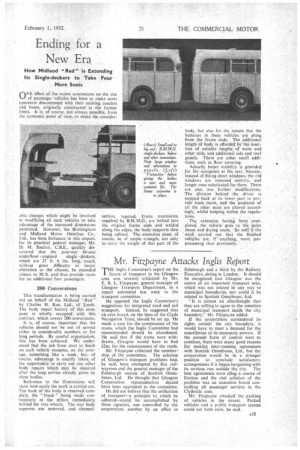Mr. Fitzpayne Attacks Inglis Report
Page 55

If you've noticed an error in this article please click here to report it so we can fix it.
"THE Inglis Committee's report on the
future of transport in the Glasgow, area was severely criticized by Mr. E. R. L. Fitzpayne, general manager of Glasgow Transport Department, in a report submitted last week to the
transport committee.
He opposed the Inglis Committee's suggestions for integrated road and rail transport. Instead, he suggested that ail area board, 06 the lines of the Clyde Navigation Trust, should be set up. He made a case for the continuance of the trams, which the Inglis Committee had recommended should be abandoned. He said that if the , trams were withdrawn, Glasgow would have to find £2m. for the reinstatement of the roads.
Mr. Fitzpayne criticized the membership of the committee. The solution of Glasgow's transport problems had, he said, been attempted by five railwaymen and the general manager of the Edinburgh section of Scottish Omnibuses, Ltd. He thought that Glasgow Corporation representatives should have been appointed to the committee.
He did not believe that the unification of transport—a principle to which he adhered—could be accomplished by three agencies, one controlled by the corporation, another by an office in
Edinburgh and a third by the Railway Executive, sitting in London. It should be recognized that Glasgow was the centre of an important transport area, which was not related in any way to municipal boundaries, nor could it be related to Scottish' Omnibuses, Ltd.
" It is almost an afterthought that they are willing to agree to the retention of municipal transport inside the• city boundary," Mr. Fitzpayne added.
If the corporation surrendered its rights outside the city boundary, it would have to meet a demand for the cancellation of its monopoly powers. If the present form of control were to continue, there were many good reasons for making inter-running agreements with Scottish Omnibuses, Ltd., but the corporation would be in a stronger position to conclude satisfactory arrangements if it began bargaining with its services run outside the city. The best agreements were ofte,o a source of friction and the Teal solution of the problem was an executive board controlling all passenger services in the Clydeside area.
Mr. Fitzpayne attacked the parking of vehicles in the streets. Parked vehicles and a public transport system could not both exist, he said.
























































































